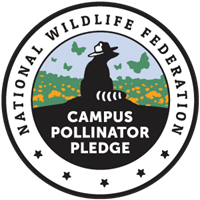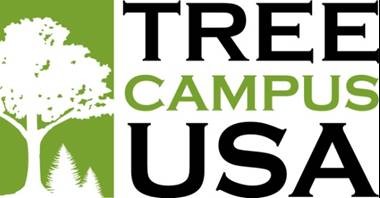Sustainable Landscaping Management
At WKU, we strive to utilize sustainable, best practices, such as water conservation, storm water management, and lower combustion engines, while maintaining the highest level of aesthetic and appeal possible. Campus services have replaced all of our gas burning riding mowers with lower emission, bio-ready diesel mowers. We are incorporating more drought resistant, native plant xeriscapes, rain garden and habitat gardens. Native plants attract a more diverse array of native animal species, further increasing biodiversity within the campus landscape. We are harvesting rainwater, using organic pesticides, such as neem oil, in our greenhouses. In many of our gardens we have mulched with gravel rather than organic mulches, improving the longevity and water filtration.
Certified Wildlife Habitat
WKU's 206 acre main campus is a Certified Wildlife Habitat by the National Wildlife Federation. Anywhere from a personal garden to an outdoor workspace can be certified as a wildlife habitat. Spaces must prove that they meet provide various elements to help support the nature surrounding them. These include food, water, shelter, and places to raise young. Sustainable practices must be employed within the space such as avoiding chemical pesticides and reducing exotic species. WKU became a Certified Wildlife Habitat in 2017 and has greatly improved on necessary measures to stay true to this commitment.
Environmentally Preferrable Materials
WKU uses only organic fertilizer that preserve pure sources of organic matter without the use of driers or heaters. Derived from 100% all-natural composted poultry manure, bioassays reveal an excellent biology ideal for optimizing a soil's biomass immediately upon application. Inoculants are not needed. Good microbes occur naturally. Additionally we always try to source locally grown and native plant selections for our landscapes. It is critical to use these native local plants because they are more drought tolerant reducing the use of water need to keep them alive. We also almost exclusively use harvested rainwater to fill tree bags and water landscape beds when needed.
Hydrologic Integrity
A proactive problem solving approach to our numerous and historic storm water issues will result from the communication, coordination and cooperation between grounds, maintenance, building services and PDC. By recording the data, monitoring our corrective efforts and being apprised to approaching weather conditions. Many of the existing ground level storm drains have been subject to contamination such as leaves, mulch trash and other materials. One way to help minimize this is to enhance the run-off channels and create deliberate swales for the storm water to flow through.
Integrated Pest Management
WKU does not store or apply any pesticides in house and we implement several programs including but not limited to; planting and maintaining very diverse micro-habitats and ecosystems that encourage high populations of predatory insects that feed on invasive pests, we even purchase live lady bugs to help combat aphids, mites and adelgid infestations. In addition to maintaining biodiversity, organic fertilizers that contain natural plant auxins and live microbes are utilized. This inhibits the growth of broadleaf weeds and minimize fungal growth on turf grass. The most effective method of controlling weeds on our campus lawns, has been to establish and maintain healthy and vigorous turf. We achieve this goal through methods such as mowing height, smart irrigation, implementing an aggressive organic fertilizer regimen and over-seeding with the appropriate turf in the appropriate areas. Over the past several years, we have been able to steer away from the overuse of dangerous chemical pesticides and moving in the direction of organic based naturally occurring compounds which promote healthy turf and limits weed growth naturally.
Soil Management
In an effort to continually improve and enhance the conditions of the soils, WKU uses only organic based fertilizers that contain microorganisms that are fundamental for building healthy soil. Soil is the quintessential element for all growing things. We also implement a regimented aeration program which increases oxygen levels to the root zone.
Snow and Ice Removal
In recent years, WKU is using less calcium chloride and has moved toward using more a solid commercial de-icer. This is granulated calcium magnesium acetate, a patented chemical formulation from dolomitic lime and acetic acid. It is identified as a low corrosion, environmental alternative to road salt by the U.S. Federal Highway Administration. CMA is used worldwide to answer environmental concerns such as pollution, soil contamination of heavy salts and solve problems associated with corrosion and concrete spalling.
Tree Campus USA
WKU's campus became a Tree Campus USA in 2011. The Tree Campus USA program recognizes campuses that effectively manage their campus trees, form partnerships in the community related to healthy forest initiatives, and encourage student engagement through service learning opportunities. Certified universities must establish a tree advisory committe, create a campus tree care plan, dedicate funds for tree-planting and management, observe Arbor Day annually, and create service learning projects.
Waste Minimization
Every year, when trees need to be trimmed or cut down, they are ground and taken to the university farm and reused as mulch. As an urban campus with approximately 3000 trees, the fall leaf collection season creates a unique challenge. WKU sits on a hill, and therefore we need to make sure drains are clear to prevent flooding, sidewalks are free of leaves, and the lawns are clean as not to impede the fall over seeding operation. We are able to address these challenges with diesel-powered leaf vacuums, hi-volume backpack blowers, and turbine-style forced air blowers. Each year we collect and grind leaves from the campus and then reuse this organic material the following spring for compost in our annual and perennial landscape beds. On a few occasions we have actually been able to re-use extracted bedrock from construction sites to construct stone walls and other landscape features.
WKU's Campus Pollinator Pledge
Pollinators play a critical role in providing food for both people and wildlife. By incorporating pollen-rich plants into landscaping, we provide nutrition to pollinators. Bees, bats, and butterflies move from one plant to the next, carrying pollen as they go. As they travel, they fertilize plants and increase reproduction. Pollinators are an important link in the food chain and provide a source of protein for birds, reptiles, and amphibians. WKU committed to the National Wildlife Foundation Campus Pollinator Pledge in 2019.
Here are our action items:
- Launch a campus campaign on pollinators highlighting why pollinators are important and how individuals can take action on campus and at home.
- Convene campus maintenance/operations department staff and identify opportunities for revised mowing programs and milkweed / native nectar plant planting programs.
- Increase the percentage of native plants, shrubs and trees that must be used in campus landscaping ordinances and encourage use of milkweed where appropriate. Change weed or mowing ordinances to allow for native prairie and plant habitats.
- Work with campus faculty and staff to ensure pollinator conservation is a long-term priority for the campus and included in the campus’s Master Plan, Sustainability Plan, Climate Resiliency Plan or other campus plans.
 .
. 

